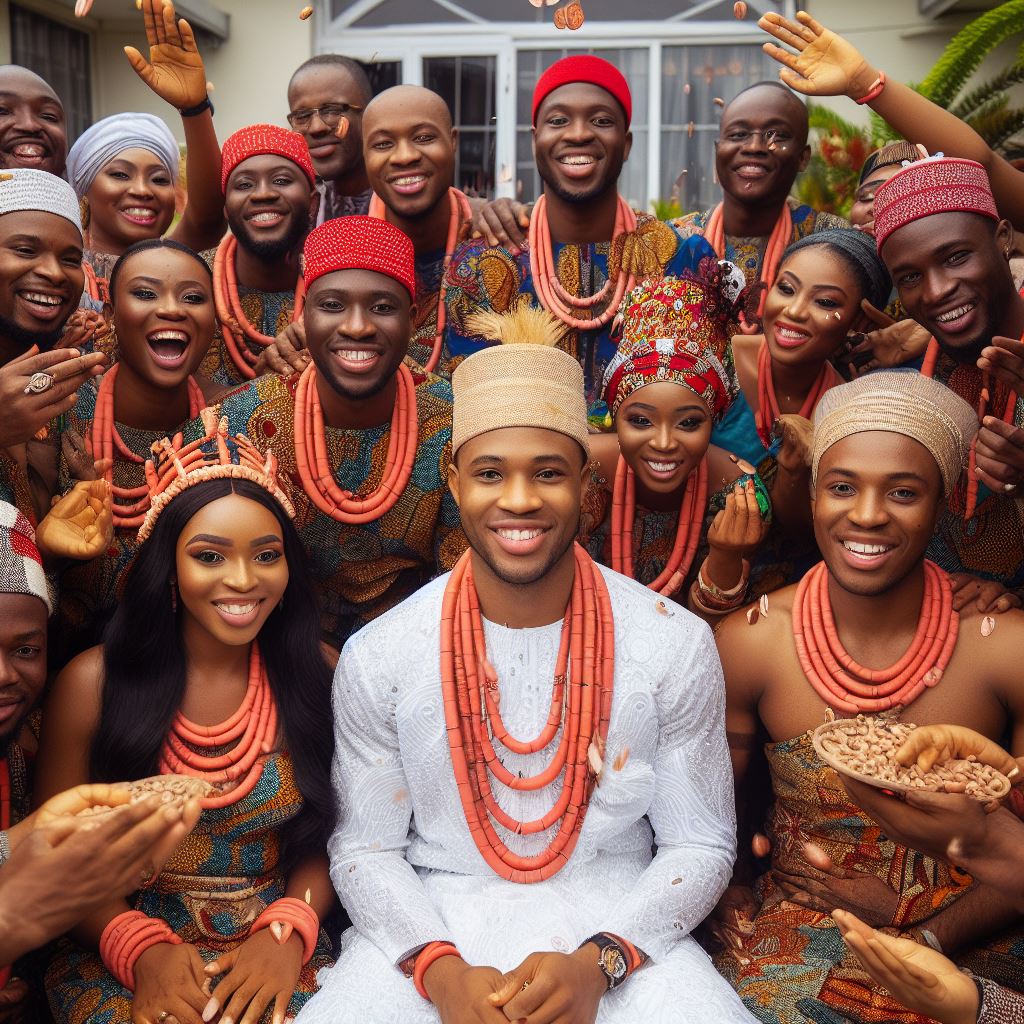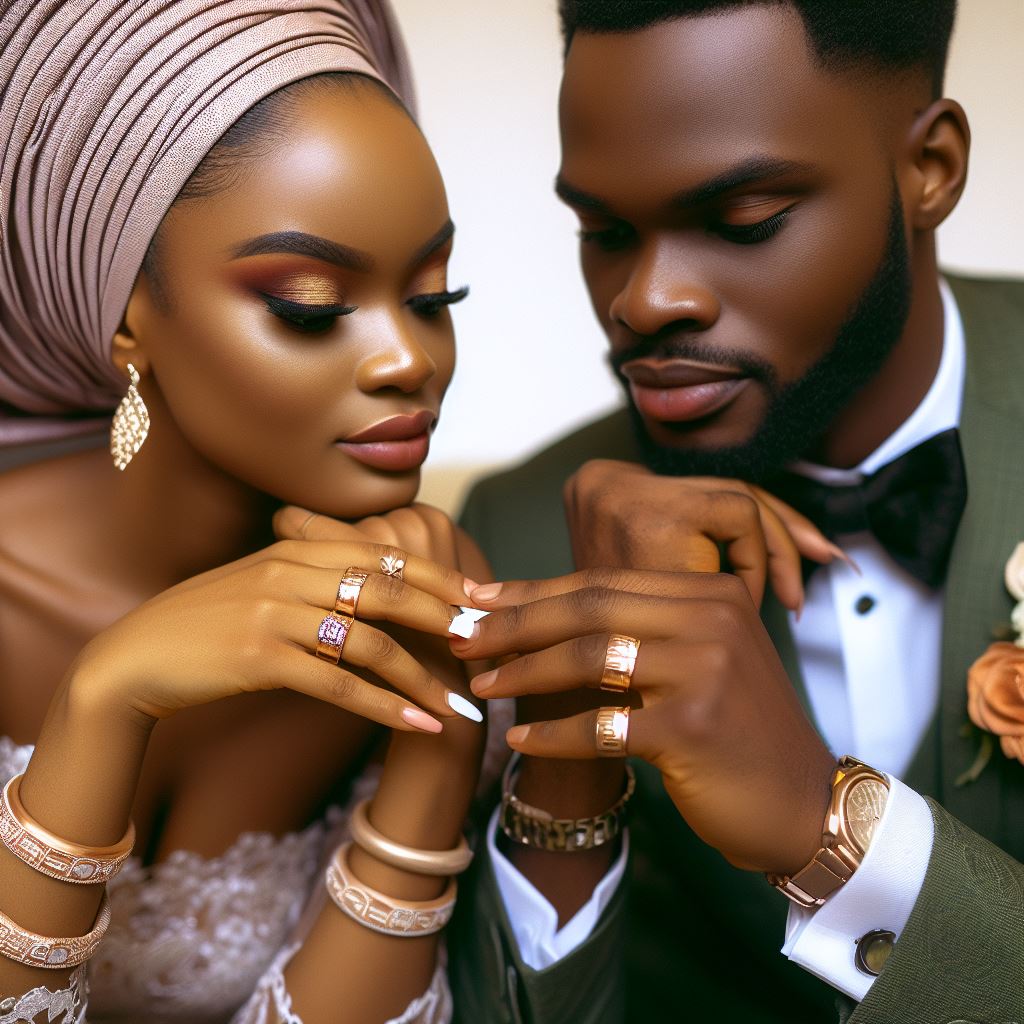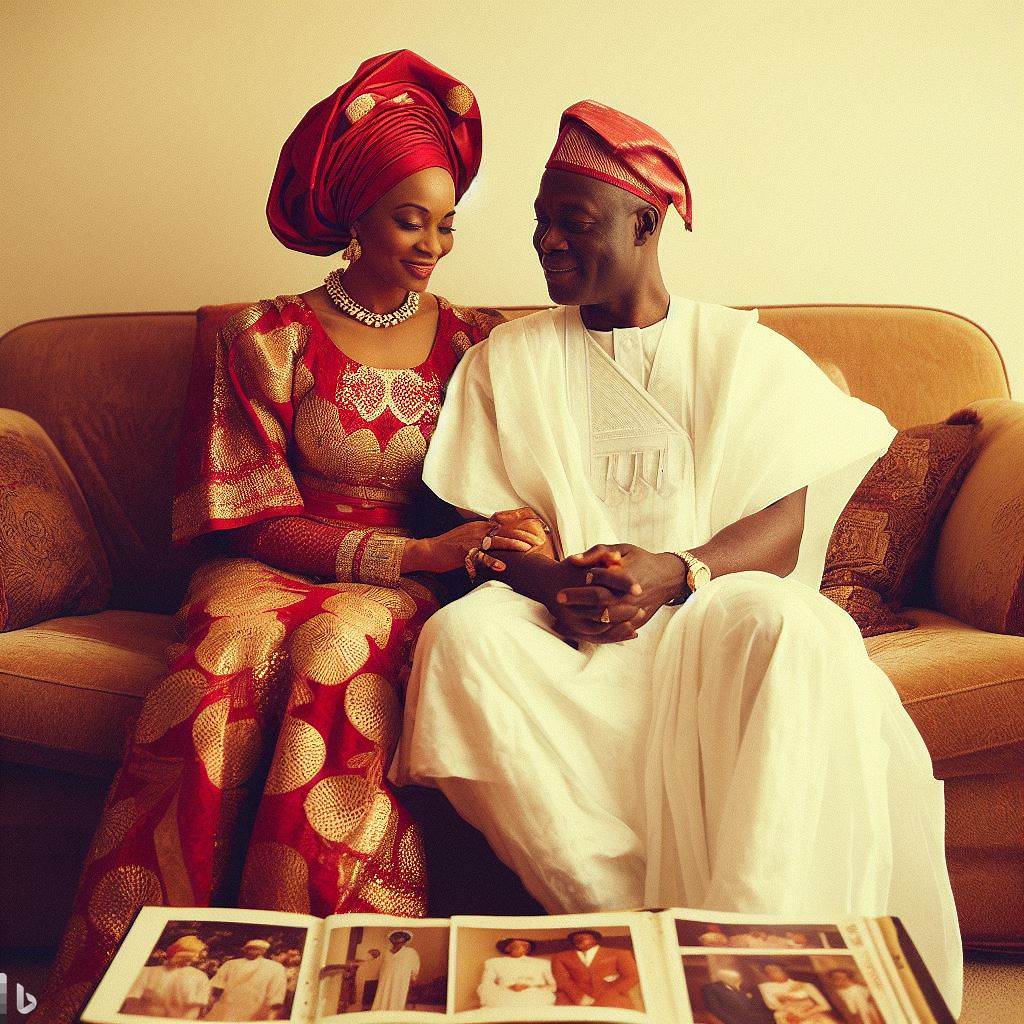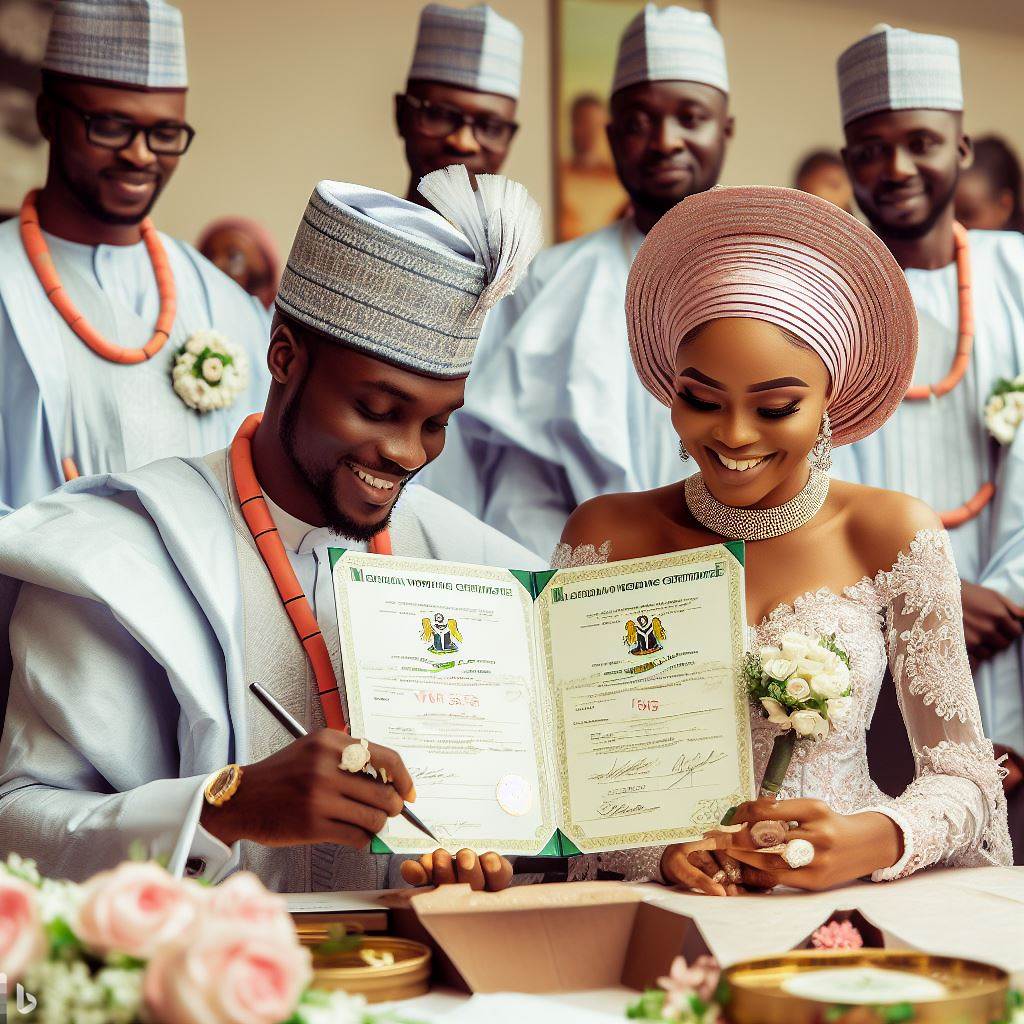Introduction
Igbo culture holds great importance in Nigeria, known for its rich traditions and customs.
Marriage ceremonies have a special significance in Igbo culture, symbolizing the union of two families.
These ceremonies serve as a platform for showcasing the culture, values, and beliefs of the Igbo people.
They are elaborate events that involve various rituals, dances, and feasts.
The bride and groom, along with their families, participate actively in these ceremonies, ensuring their success and prosperity.
Igbo marriage ceremonies are not only about the union of the couple but also about the unity and harmony among their families and communities.
These ceremonies are seen as a way to celebrate love, strengthen social bonds, and honor ancestors.
They are characterized by traditional attire, music, and dance, which add to the festive atmosphere.
The significance of marriage ceremonies in Igbo culture goes beyond the couple themselves, as they represent continuity, heritage, and the passing down of traditions to future generations.
The ceremonies also play a crucial role in establishing social status and relationships within the community.
Igbo marriage ceremonies are deeply rooted in tradition and hold immense cultural and social importance in Nigeria.
Read: Harmonizing Love and Faith: Nigerian Couple’s Anniversary Prayer Rituals
Traditional Igbo Marriage Ceremonies
Description of the main stages and components of an Igbo marriage ceremony
1. Introduction and inquiry process (ime ego)
During this stage, the groom’s family seeks permission from the bride’s family to introduce themselves and ask for their daughter’s hand in marriage.
2. Meeting of families (ime ego n’ile)
The families of the groom and bride come together to discuss the proposed marriage and get to know each other better.
3. Bride price negotiation (ime ego nwanyi)
In this stage, the groom’s family presents gifts and money to the bride’s family as a token of appreciation and to secure the bride’s hand in marriage.
4. Exchange of gifts and consent (ime ego mkpuru okwu)
Both families exchange gifts, usually consisting of food, drinks, clothing, and other valuable items. The bride’s family also gives their consent for the marriage.
5. Exchange of traditional vows and blessings (ime ego igbankwu)
The couple, along with their families, partake in the exchanging of traditional vows, expressing their commitment and love for each other. Blessings are also invoked by elders and family members.
6. Breaking of kola nut and sharing of wine (ime ego nkwu)
In Igbo marriage ceremonies, traditions hold deep cultural significance.
The groom’s family formally requests the bride’s consent, showing respect and building a strong foundation.
Families interact to establish trust, and bride price negotiation symbolizes the groom’s appreciation.
The exchange of gifts and consent signifies acceptance, using items of cultural importance.
Traditional vows and blessings seek elder and family blessings, emphasizing the role of family and community.
Finally, the groom breaks a kola nut, marking the unity and celebration of the marriage, symbolizing the breaking of barriers and the establishment of a lifelong bond.
These carefully planned stages are crucial in securing the couple’s union and creating a strong bond between their families.
Read: How Religion Impacts Marriage Counseling in Nigeria
Messages and Significance in Igbo Marriage Ceremonies
Symbolism of the various rituals and customs performed during the ceremony
1. Importance of the introduction and inquiry process in establishing consent and readiness for marriage
The introduction and inquiry process is crucial as it ensures that both families are aware of the intentions of the couple and that consent is given by all parties involved.
This helps to establish the foundation of the marriage and ensure that everyone is onboard.
2. Role of the bride price negotiation in symbolizing the groom’s commitment and the bride’s value
The bride price negotiation plays a significant role in Igbo marriage ceremonies as it symbolizes the commitment of the groom to take care of the bride and the value that the bride holds within her family.
It serves as a demonstration of the groom’s willingness to provide for his future wife.
3. Symbolic meaning behind the exchange of gifts and consent, emphasizing unity and harmony
The exchange of gifts and consent during the marriage ceremony is a powerful symbol of unity and harmony between the two families.
It represents the coming together of two families and the acceptance of the couple by both sides.
It highlights the importance of mutual respect and understanding in a marriage.
4. Significance of the traditional vows and blessings, expressing marital responsibilities and expectations
The traditional vows and blessings in Igbo marriage ceremonies express the marital responsibilities and expectations that both partners should uphold.
These vows serve as a reminder of the commitment made by the couple to each other and the obligations they have towards their union.
They reinforce the importance of loyalty, love, and support in a marriage.
5. Meaning of breaking kola nut and sharing wine, representing unity, hospitality, and acceptance
Breaking kola nut and sharing wine are essential rituals in Igbo marriage ceremonies.
It represents unity, as the breaking of the kola nut signifies the breaking down of barriers between the families and the coming together as one.
The sharing of wine symbolizes hospitality and acceptance, as it is a gesture of welcoming the new member into the family.
In fact, Igbo marriage ceremonies are rich in symbolism and significance.
From the introduction and inquiry process to the exchange of gifts and traditional vows, each ritual holds a special meaning.
These ceremonies emphasize the importance of consent, commitment, unity, and acceptance, thereby establishing a strong foundation for a successful and harmonious marriage.
The breaking of kola nut and sharing of wine further reinforce the values of unity, hospitality, and acceptance within the family.
Igbo marriage ceremonies are not just a celebration of love; they are a reflection of the cultural values and traditions that have been passed down through generations.
Read: Cost of Marriage Counseling in Nigeria: Budgeting for Harmony

Cultural Importance and Societal Significance
Discussion on the role of Igbo marriage ceremonies in preserving cultural heritage
- Igbo marriage ceremonies play a vital role in preserving the rich cultural heritage of the Igbo people.
- Each ritual and tradition in these ceremonies is deeply rooted in Igbo customs and practices.
- From the pre-wedding rituals to the bride price negotiations, every step reflects the values and beliefs of the Igbo community.
- These ceremonies ensure that the cultural heritage is passed down to future generations and remains intact.
- The traditional attire worn by the bride and groom, the music and dance performances, and the use of local delicacies all contribute to the preservation of Igbo culture.
Exploration of the ceremonies’ impact on community cohesion and identity
- Igbo marriage ceremonies have a profound impact on community cohesion and the sense of identity.
- These ceremonies bring the community together as they involve the participation of family members, friends, and even the entire village.
- Through these ceremonies, the Igbo community reinforces a sense of unity, shared values, and common goals.
- The rituals and traditions during the ceremonies create a bond among the attendees, strengthening their relationships.
- Participating in these ceremonies fosters a sense of belonging and pride in one’s Igbo identity.
Analysis of the social and familial significance of Igbo marriage ceremonies
- Igbo marriage ceremonies hold great social and familial significance in Igbo society.
- These ceremonies mark the union not only of the bride and groom but also of their families.
- They serve as a platform for families to meet, interact, and establish connections.
- The ceremonies provide an opportunity for the couple’s families to forge relationships that go beyond the immediate union.
- Additionally, Igbo marriage ceremonies serve as a way to showcase the wealth and status of the families involved.
In short, Igbo marriage ceremonies are essential for preserving the cultural heritage of the Igbo people.
These ceremonies not only strengthen community cohesion but also contribute to the overall sense of identity among the Igbo population.
Furthermore, these ceremonies hold significant social and familial importance, creating lasting connections between families and showcasing their status.
Igbo marriage ceremonies are not just a celebration of love and union but are also a celebration of the rich Igbo culture and traditions.
Read: Understanding the Dynamics of Marriage Life in Nigeria
Conclusion
In this blog post, we explored the messages and significance of Igbo marriage ceremonies in Nigerian society.
We discussed the importance of these ceremonies in preserving and passing down cultural traditions, the role of marriage as a social and economic institution, and the symbolism behind various rituals and customs.
Final thoughts on the messages and significance of Igbo marriage ceremonies in Nigerian society
Igbo marriage ceremonies hold immense cultural and societal importance.
They are not merely about two individuals coming together but serve as a celebration of heritage, identity, and community.
These ceremonies reinforce the values of unity, love, and respect within the Igbo culture, creating a strong foundation for families and society as a whole.
In addition, Igbo marriage ceremonies contribute to preserving and promoting cultural diversity in Nigeria.
They showcase the richness and uniqueness of the Igbo traditions, serving as a reminder of the importance of cultural heritage in a globalized world.
Overall, Igbo marriage ceremonies are not just joyous occasions but also bear profound messages and significance.
They serve as a platform for the transmission of cultural values, norms, and beliefs, ensuring the continuity of the Igbo culture.
These ceremonies are a testament to the resilience and pride of the Igbo people and their commitment to upholding their customs and traditions.



